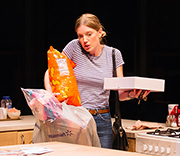By Laura Collins Hughes
The store-bought birthday cake in Utility gets me every time: sliding to the kitchen floor still in its box, ruined on the eve of a little girl’s party.
Smashed cakes onstage are usually comedy, or farce. But for Amber, the bone-weary woman at the center of Emily Schwend’s stealth bomb of a drama, this one is a small, slow-motion disaster, the kind of tiny misfortune that drains the spirit because there is no money to get a replacement — which means no sparing her daughter the disappointment of an unsightly cake, or herself the embarrassment of serving it anyway. With two low-wage jobs, three young kids, and a cheating husband who doesn’t much mind that he barely works, Amber has trouble even keeping the lights on. She has trouble, too, remembering the person she used to be before her existence became a constant desperate scramble.
You can tell a feminist play by whose lives it bothers to take seriously. In New York, where Utility premiered in early 2016, an abundance of young female playwrights is lately setting the stage ablaze with stories about a whole swath of the populace — girls, that is, and women — that the theatre had trouble taking seriously until about five minutes ago. A girls’ football team and its players’ teenage dynamics propel Sarah DeLappe’s The Wolves, with an all-female cast of 10. A flock of competitive dancers on the cusp of adolescence is at the center of Clare Barron’s Dance Nation. In Aleshea Harris’s Is God Is, grown twin sisters set out to wreak vengeance on the father who almost killed their mother and horrifically wounded them.
Utility belongs to that same thrilling wave. It isn’t as flashy or physical as any of those plays, nor does it mean to be, yet it’s just as feminist: a portrait in miniature of a woman in an arid landscape of economic desolation. Scratching out a worried living and holding close her little ones, Schwend’s Amber is contemporary kin to the photographer Dorothea Lange’s Depression-era Migrant Mother. The drama of Amber’s days has everything to do with scarcity — of money, of time, of opportunity, of understanding — and the precariousness of the scaffolding of her life. Let a single screw loosen and the whole structure could come crashing down.
It’s a quiet play, and quietly political, but like Lynn Nottage’s Sweat — the first drama to win the Pulitzer Prize after Donald Trump took office — it has great resonance in this fractious moment. Sweat, about a group of working-class people in a shrinking industrial city where employment has nearly dried up, had just opened when the election results turned the media’s attention to the white underclass, men in particular, whose bitter disenfranchisement was thought to have propelled Trump into office.
Utility, which premiered Off Broadway earlier that year, is a more intimate, immediate play, and a more vivid one, vibrating with some of the same social tensions. In another era, Amber and her husband, Chris, might have had stable blue-collar jobs. In this one, undependable shift work is the best they can find — and where they live, in East Texas, having a car to travel long distances to work is a need, not a luxury. They’re at a disadvantage by owning just one between them: hers, naturally.
If there’s a likely Trump voter in this play, though, it’s probably not Amber (too strapped for time) or Chris (too lazy) but Amber’s mother, Laura, who gets her ideas about vaccines from scary things she watches on TV and sets an abysmally low bar for praiseworthy male behavior. “I know it wasn’t the easiest thing for you,” she tells Amber, who after a separation has taken Chris back despite his infidelities and general uselessness. “But there ain’t a lot of men willing to do right by their kids these days.”
The egregious harmfulness of that double standard — the gold stars he gets just for showing up, while Amber toils relentlessly to support him and the children — is part of what Schwend wants us to consider: how easily we take female labor for granted and how deeply enervating and dehumanizing that can be. There is of course nothing new in that, or in the notion of a woman working so hard for her family’s survival that she loses herself in the process. It happens all the time.
And that’s the point of putting such an ordinary woman at the center of a play. To recognize the drama in that tenacity and pain, to deem it worth depicting with artistry and grace — that in itself is a feminist act. Amber is an Everywoman, and attention must be paid.
Laura Collins-Hughes is an American arts journalist, who regularly writes for The New York Times



